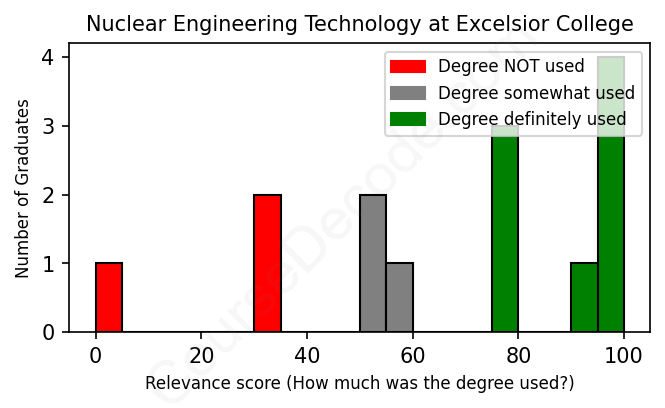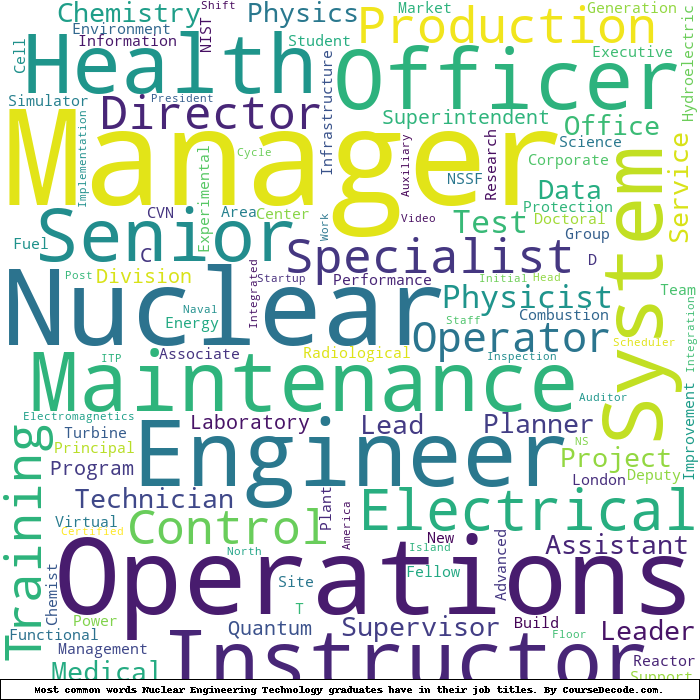
First, some facts. Of the Nuclear Engineering Technology graduates from Excelsior College we've analyzed , here's how many have used (or NOT used) their degree in their career:

These are estimates based on AI analysis of 14 LinkedIn profiles (see below).
The verdict? On par with the average. Overall, with an average relevance score of 67%, Nuclear Engineering Technology graduates from Excelsior College have about the same likelihood of finding work in this field as the average graduate across all fields:
And for comparison, here's the chart for all profiles we've looked at across all degrees.
Also, after graduating, 35% of these graduates have pursued further education other than another Bachelor's degree (such as a Masters degree or other), which is right in line with the average across all fields.
See the details:
|
Relevance score: 50% We think this person has gone into a career only somewhat relevant to their degree. We think this person has gone into a career only somewhat relevant to their degree.
DEGREE INFOGraduated in 2018 from Excelsior College with a Bachelor's degree in Nuclear Engineering Technology. No other secondary education since. JOB HISTORY SINCE GRADUATIONFloor Operations Manager Walmart Distribution Center Jul 2019 - Jul 2020 Implementation Manager  Walmart Distribution Center Jul 2020 - Present ABOUTVersatile supervisor skilled in project and personnel management who thrives in challenging and dynamic situations. Extremely energetic and motivated. |
The top 10 most common jobs done by the graduates we've analyzed (ranked most common to least) are:
When looking at careers taken up by graduates of Nuclear Engineering Technology from Excelsior College, there’s a mix of roles, but the most common positions tend to be in energy and nuclear sectors. Many graduates have found their way into jobs at major organizations like Arizona Public Service and Los Alamos National Laboratory, where roles like System Operations Planner, Nuclear Engineer, and Auxiliary Operator are prevalent. These positions typically leverage the technical knowledge and skills acquired during their studies, making them highly relevant to their degree. Additionally, jobs such as Reactor Maintenance Officer and Nuclear Medical Science Officer showcase how these graduates often end up directly in areas where nuclear engineering expertise is crucial.
However, not all paths taken by these graduates are directly connected to nuclear engineering. Some roles, like Training Specialist, Office Manager, or even Production Management Assistant, involve skills not specifically tied to nuclear technology. In these cases, while some general engineering or management knowledge might play a part, the link to their Nuclear Engineering Technology education is weaker. Overall, it seems like a good number of graduates are utilizing their degree in relevant positions within the nuclear energy sector, while others have ventured into roles where their specialized skills are not as prominently required. This leads to a varied landscape where the relevance of their job might depend heavily on the specific role and organization they choose to work with.
Here is a visual representation of the most common words in job titles for Nuclear Engineering Technology graduates (this is across all Nuclear Engineering Technology graduates we've analyzed, not just those who went to Excelsior College):

From analyzing the career trajectories of graduates with a degree in Nuclear Engineering Technology from Excelsior College, it seems like many have landed quite solid positions in the nuclear and energy sectors shortly after graduation. For instance, graduates often start out in roles like Operations or Engineering, which are pretty relevant to their field. Many transitioned into jobs at significant organizations, such as Arizona Public Service and Los Alamos National Laboratory. This pattern indicates that their first jobs are typically related to nuclear operations, control, and maintenance. It’s a good sign that these graduates are entering valuable careers in fields that utilize their education and skills right off the bat.
As we look at their careers five to ten years down the line, the trend continues to show robust growth. A number of graduates are taking on higher-level management and specialist roles, such as Nuclear Inspection Division Head and Deputy Director at notable labs and military installations. This suggests a positive trajectory where they don’t just stay stagnant but instead progress into positions that carry more responsibility and specialization. While there are a few graduates who have veered into unrelated areas, like office management or video production, the overall picture is quite promising. Many alumni seem to be thriving and advancing in their fields, reflecting well on the education they received at Excelsior College.
Getting a Bachelor’s degree in Nuclear Engineering Technology can be pretty challenging, but it really depends on your strengths and interests. At Excelsior College, they focus on making online learning accessible, which can make things a bit easier for some folks, especially if you’re good with self-discipline and time management. The material is heavily technical, involving subjects like radiation physics, thermodynamics, and reactor principles, so if you're not into math and science, it might feel tough. Overall, it’s generally more complex than some other degrees, but if you have a passion for the topic and are willing to put in the effort, you can totally handle it!
Most commonly, in the LinkedIn profiles we've looked at, it takes people 2 years to finish a Bachelor degree in Nuclear Engineering Technology.
Looking at the career paths of these Nuclear Engineering Technology graduates from Excelsior College, it seems like they’re doing pretty well in terms of making decent money. Many of them have landed jobs with solid titles and at reputable organizations like the Navy, Los Alamos National Laboratory, and various energy companies, which typically offer competitive salaries. For instance, someone working as a Laboratory Director or a Manager at a nuclear shipyard is likely making a six-figure salary. Even those who started out in more entry-level roles, like the training specialist or office manager, eventually moved up into higher-paying positions. Overall, it appears that these graduates have successfully leveraged their education into fulfilling careers with good earning potential in the nuclear and energy sectors!
Here is a visual representation of the most common words seen in the "about" section of LinkedIn profiles who have a Bachelor degree in Nuclear Engineering Technology (this is across all Nuclear Engineering Technology graduates we've analyzed, not just those who went to Excelsior College). This may or may not be useful:

Here are all colleges offering a Bachelor degree in Nuclear Engineering Technology (ordered by the average relevance score of their Nuclear Engineering Technology graduates, best to worst) where we have analyzed at least 10 of their graduates:
| College | Score | Count |
|---|---|---|
 Excelsior College Excelsior College
|
67 | 14 |